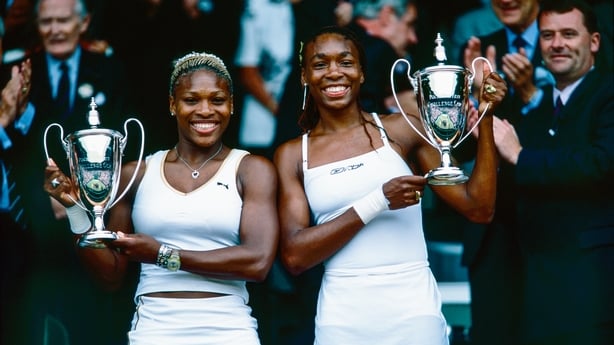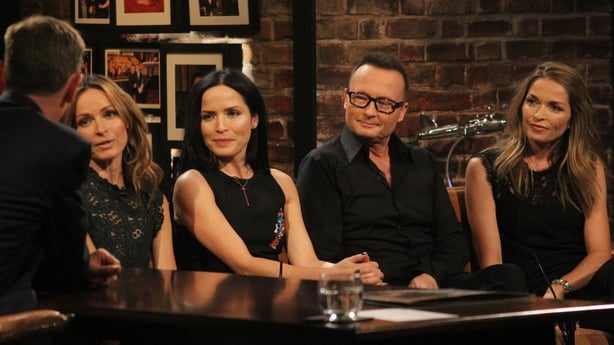First born, second child, middle child, only child, the baby of the family: does birth order really mean anything when it comes to our personalities? The short answer is yes - and no. It's not so much about biological differences, it’s more about how your parents treat you.
Dr Ann Marie Creaven (first born) from the Department of Psychology at University of Limerick and GP and mental health specialist Dr Harry Barry (second born) joined Claire Byrne (middle child) on RTÉ Radio 1’s Today with Claire Byrne to talk about whether where you’re born in our family order influences the type of person you are. (This piece includes excerpts from the conversation which have been edited for length and clarity - you can hear the discussion in full above.)
"There’ll always be subtle differences from family to family but it's amazingly consistent. Jokes aside, it does actually impact on our future life and how our relationships will be and even on our mental health, which is quite extraordinary," says Barry.

Creaven first became interested in this area at the young age of ten. "So I was devastated when I learned in more recent years, that the evidence linking birth order to biological differences in personality isn't really very meaningful," she says. "But that doesn't mean birth order is not relevant, it just means that it doesn't determine whether we're more extroverted or open to experiences. It does mean though, that parents might raise us differently and that can have an impact on family dynamics and how we behave."
It's not just our behaviour, our health outcomes can also be affected by birth order, says Creaven. "There's a scattering of studies that look at birth order and one study found [later born children in large families] are at greater risk for hospitalisation for avoidable injuries, probably because parental attention is that bit more stretched. There’s other research suggesting that parents have more communication with firstborns about sex and relationships, because for younger siblings their older siblings sometimes take some of that on."
The oldest child
The oldest child gets the full attention of their parents from day one, says Barry. "They're going to be more organised, they're going to be often very responsible, they feel that they have to achieve more. The parents expect them to look after for siblings coming up. They nearly feel that they are the ones that should be in charge of siblings even as parents begin to move out of the picture, as life goes on. There's often real fireworks between the eldest child and the parents and to a certain extent they're kind of taking the hits for the kids that are coming on behind them, they’re breaking new ground."
We need your consent to load this rte-player contentWe use rte-player to manage extra content that can set cookies on your device and collect data about your activity. Please review their details and accept them to load the content.Manage Preferences
From RTÉ Radio 1's Brendan O'Connor, Psychologist Maureen Gaffney talks about the dynamics and importance of sibling relationships
Creaven adds: "The first child in the family is the first time parents get to be parents, so it's the only time they'll have this concentrated focus on one particular child. So that's really them learning how to be parents." Studies show that parents tend to be more relaxed with subsequent children. "That that doesn't mean children in different birth orders have different personalities, it just means they're reared in a slightly different way," she says.
Parents also often say to their oldest child that they’re "the big one" and give them responsibilities. "That's why, in my experience, first-born children are more likely to suffer from being anxious, because they want to be in control," says Barry. "It's almost this sense of control is being exerted on them from very young and they got burned out, because they become the helpers." Even when it comes to twins, eldest twin still becomes "the oldest" and will behave like that, he says.
The second-born
"In my experience over the years, paradoxically the people I see, say adolescents or young adults, are very frequently the second child," Barry says. "I don't know why this is, but my my instinct is that the second-born child is kind of in the lee of the the first child. It's almost as if they’re in their shadow all the time. I see this over, and over, and over again. It's a false perception of course, because the parents loved each one individually, but it's the perception that the young person often has.

"What that leads to, in my experience, is poor self-acceptance, a lot of insecurity. I find that this group find it very difficult to find direction in their lives very often, it seems to take them a lot longer to settle down from an emotional point of view, a relationship point of view, and they struggle for a long time with this emotion of hurt."
"Depending on family size you're going to have the most firstborns right and the next number of second borns, so you are just going to see more first and second borns in practice than you would somebody who is at the tail end of a family," Creaven says. "But there's a small line of research that in recent years has been shown to be relatively consistent -- so it's not a horoscope -- that do find the first-born can follow a traditional career path or maybe what parents expect of them in terms of career path. So it wouldn't be surprising for later siblings to find that they're a little bit more lost, or not sure where to go."
The middle child
There is a "slight" difference between being second and being in the middle, Barry says. "The middle child traditionally actually has a fairly nice little cushy number because they’re kind of tucked away in the middle of it all, the parents are kind of beginning to kind of get more relaxed, the others are taking the hits for them," he says. "Very interestingly the middle child is regarded as the negotiator and this is really common actually, the peacemaker.
We need your consent to load this rte-player contentWe use rte-player to manage extra content that can set cookies on your device and collect data about your activity. Please review their details and accept them to load the content.Manage Preferences
From RTÉ Jr's Rearing to Go, is middle child syndrome fact or fiction?
"Certainly if you're reared in a family where you're close in age to the older and younger siblings you'll find yourself in that role," Creaven elaborates. "So it doesn't mean you actually have any innate skill it just means that you probably have a little bit more practice." Meanwhile, both second children and middle children will often try to excel in areas other than what the first born or the oldest child will, Barry says. "There’s a desire to seem to stand out."
The youngest
"The youngest child, in so many senses they had the easiest spot," says Barry. "Because the parents are easy-going at that stage. They get away with things and they begin to realise that they can get away with things — they’re always looking for that bit of attention, they can be charmers, they can be risk-takers, but get very easily frustrated. What’s very interesting is they have poor self-discipline, they often do badly in the marshmallow test.
"The idea behind the marshmallow test is, you give them a choice: you can have one marshmallow now or two marshmallows later. The "good" child, say the first child, will often say "I'll wait, I'll have the two marshmallows later". The youngest child will say, "give me the marshmallow". The problem with this is, that if you actually go a little bit forward, when it comes to real life then, unfortunately this begins to show because they want it now, they want the instant gratification," he says. "But then on the other hand, they’re probably more relaxed, probably more sociable. They don't have the same pressures on. In some ways, these are the ones who may drift through life and let everybody else take the hit."
We need your consent to load this rte-player contentWe use rte-player to manage extra content that can set cookies on your device and collect data about your activity. Please review their details and accept them to load the content.Manage Preferences
From RTÉ Radio 1's Drivetime, what fights are worth picking with your kids?
The only child
The only child is "everything in one," Creaven says. "There are some stereotypes about older children as not being as sociable or maybe lacking social skills, but as that person probably knows themselves, the evidence doesn't support that. When you are the only child, parents have all their eggs in one basket, they invest their attention in you, they give you opportunities to socialise and do your hobbies, and that can probably compensate for the socialisation experiences you'd get from siblings otherwise.
READ: Why has parenting become so intensive, demanding and expensive?
"While there are downsides to being an only child, there are also potentially positives. We do see some differences in motivations to succeed in life. Because when parents invest all their time in you, that child has a little bit of a head start and it’s certainly easier to be motivated and to feel you can achieve when you were on that strong start," she says.
Barry adds that only children are often very self-confident and self-assured. "They seem to accelerate faster, they seem to grow up much more self-sufficient. They're well able to be on their own, they are happy in their own space."
The views expressed here are those of the author and do not represent or reflect the views of RTÉ.